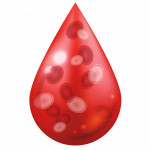Certain “markers” of inflammation in the body are linked to an earlier death among people with HIV, including those coinfected with hepatitis C. This possibly helps explain the reason why, even when treated for the virus, particular HIV-positive people die before others.
Researchers followed 400 HIV-positive alcohol abusers, half of whom also had hep C, for three to five years between 2001 and 2009. The participants were tested for seven pro-inflammatory cytokines, also known as markers, at the beginning of the study and then tracked to see if they died. (The study results are relevant to non-abusers as well.)
Cytokines are proteins that alert white blood cells to flock to a zone of inflammation. In the short term, this process is good for the body—it’s how fungal or bacterial infections are cleared, for example. But in the long-term it can be harmful.
The researchers found that higher indicators of inflammation were strongly linked to an increased risk of death, a connection that persisted regardless of whether or not an individual was taking ARVs. The inflammatory marker known as interleuken-6 (IL-6) had the most significant connection to mortality.
Study author Judith Tsui, MD, MPH, an assistant professor of medicine at Boston University School of Medicine, says, “I was actually surprised that IL-6 was so strongly associated with death, even 10 years later, after such a long follow-up period, which I think speaks to the fact that it is an important marker of inflammation.”
Inflammatory Marker Linked to Raised Risk of Death






Comments
Comments